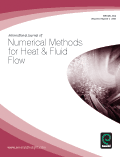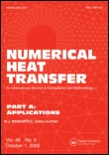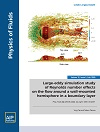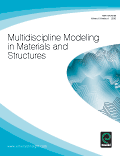
INTERNATIONAL JOURNAL OF NUMERICAL METHODS FOR HEAT & FLUID FLOW
Scope & Guideline
Advancing the Frontiers of Heat and Fluid Dynamics.
Introduction
Aims and Scopes
- Numerical Methods Development:
The journal emphasizes the development and refinement of numerical techniques, such as finite element methods, computational fluid dynamics, and lattice Boltzmann methods, to solve complex heat and fluid flow problems. - Heat Transfer Analysis:
A core area of focus is the analysis of heat transfer mechanisms, including conduction, convection, and radiation in various systems, particularly involving nanofluids and hybrid materials. - Fluid Dynamics Research:
Research articles often explore fluid dynamics phenomena, including magnetohydrodynamics, bioconvection, and non-Newtonian fluid behaviors, contributing to a deeper understanding of fluid motion under various conditions. - Application of Advanced Computational Techniques:
The journal encourages the application of advanced computational techniques, including machine learning and artificial intelligence, to enhance predictive modeling and optimization in thermal and fluid systems. - Multi-Scale and Multi-Physics Modeling:
A unique contribution of the journal is its focus on multi-scale and multi-physics modeling approaches that integrate various physical phenomena, such as thermal, mechanical, and chemical interactions, to address real-world engineering challenges.
Trending and Emerging
- Hybrid Nanofluids Research:
Research on hybrid nanofluids is on the rise, focusing on their thermal performance and applications in various engineering systems, reflecting the growing interest in enhancing heat transfer efficiency. - Machine Learning Applications:
There is a marked increase in studies applying machine learning techniques to predict and optimize heat and fluid flow phenomena, showcasing the integration of artificial intelligence in computational fluid dynamics. - Magnetohydrodynamics (MHD) Studies:
MHD is gaining traction, particularly in the context of nanofluids and their interactions under magnetic fields, indicating a trend towards exploring advanced materials and their behaviors. - Multi-Physics and Coupled Systems Analysis:
Emerging themes involve multi-physics analyses that couple various phenomena, such as thermal, fluid, and structural interactions, to solve complex engineering problems more effectively. - Entropy Generation and Thermodynamic Optimization:
Research focusing on entropy generation analyses and thermodynamic optimization strategies is becoming increasingly relevant, as researchers seek to enhance energy efficiency in thermal systems.
Declining or Waning
- Classical Heat Transfer Methods:
There seems to be a waning interest in traditional heat transfer methodologies that do not incorporate modern computational techniques or hybrid approaches, as researchers lean towards more innovative solutions. - Simplistic Fluid Flow Models:
Basic models of fluid flow, which do not account for complex interactions such as non-Newtonian behaviors or multi-phase systems, are becoming less prevalent as the demand for more sophisticated analyses increases. - Static Analyses without Computational Support:
Research focused solely on static analyses without incorporating computational elements is declining, as more studies aim for dynamic simulations that reflect real-world conditions. - Low-Temperature Applications:
There has been a noticeable decrease in studies focusing on low-temperature heat transfer applications, likely due to a shift towards high-performance systems and extreme conditions. - Limited Nanofluid Studies:
While nanofluids were a significant topic of interest, the novelty is fading, and there appears to be a decrease in studies that do not explore innovative applications or new formulations.
Similar Journals

Journal of Nanofluids
Exploring the Future of Fluid Dynamics and NanotechnologyJournal of Nanofluids, published by AMER SCIENTIFIC PUBLISHERS, is a leading international journal dedicated to the burgeoning field of nanofluid technology which bridges the areas of fluid dynamics and nanotechnology. With an ISSN of 2169-432X and E-ISSN of 2169-4338, this journal has established itself as a valuable resource for researchers and professionals in Mechanical Engineering and Chemical Engineering, particularly in the domains of fluid flow and transfer processes. Its prestigious standing is reflected in the 2023 Scopus rankings, positioning it in the 79th percentile for Mechanical Engineering and the 78th percentile for Fluid Flow and Transfer Processes. Although coverage has been discontinued in Scopus since 2021, the journal maintains a Q2 category ranking in both relevant fields, emphasizing its commitment to high-quality and impactful research dissemination. This journal aims to foster innovation and collaboration among scientists and engineers worldwide, providing a platform for groundbreaking research, reviews, and discussions on nanofluids, their properties, and applications. As an essential addition to the library of any researcher or student vested in advanced fluid dynamics, the Journal of Nanofluids serves as a pivotal conduit for advancing knowledge and technology in this exciting and evolving field.

Interfacial Phenomena and Heat Transfer
Exploring the Dynamics of Heat Transfer and InterfacesInterfacial Phenomena and Heat Transfer is a leading academic journal published by BEGELL HOUSE INC that has rapidly established itself as an essential resource for scholars and industry experts in the fields of engineering, fluid flow, and chemical processes. With an ISSN of 2169-2785 and E-ISSN 2167-857X, this journal focuses on the critical interdisciplinary aspects of heat transfer and interfacial phenomena, offering insights that span across mechanical engineering, chemical engineering, and physical sciences. Despite its relatively recent inception in 2017, it has garnered respectable recognition, with a 2023 Scopus rank placing it in the Q3 category within the disciplines of Engineering (miscellaneous) and Fluid Flow and Transfer Processes, making it a pertinent publication for those interested in cutting-edge research. As researchers and professionals navigate the complexities of interfacial dynamics, Interfacial Phenomena and Heat Transfer serves as a pivotal platform, publishing high-quality, peer-reviewed articles that aim to advance knowledge and stimulate further investigation in this increasingly vital domain.

NUMERICAL HEAT TRANSFER PART A-APPLICATIONS
Transforming theoretical concepts into practical applications in heat transfer.NUMERICAL HEAT TRANSFER PART A-APPLICATIONS, published by TAYLOR & FRANCIS INC, serves as a premier outlet for cutting-edge research in the domains of numerical analysis and condensed matter physics. With an ISSN of 1040-7782 and an E-ISSN of 1521-0634, this esteemed journal has steadily maintained its influence in the academic community since its establishment in 1989, continuing its publication into 2024. Currently ranked in the Q2 quartile for both Condensed Matter Physics and Numerical Analysis, it stands as a vital resource for researchers committed to advancing computational methodologies and applications. The journal's Scopus rankings reflect its growing impact, particularly in mathematics, where it is placed in the top 26% of its category. Although not an open-access journal, its comprehensive research articles and detailed applications foster innovation and collaboration, making it essential for professionals and students aiming to deepen their understanding of thermal transfer phenomena through numerical techniques. This journal not only bridges theory and application but also propels forward the field of heat transfer.

Propulsion and Power Research
Driving Progress in Fluid Flow and Transfer Processes.Propulsion and Power Research, published by KEAI PUBLISHING LTD, is a leading Open Access journal that has been advancing the field of propulsion and power systems since its inception in 2012. With its commitment to fostering scientific discourse and innovation, the journal has gained a prominent position within academia, achieving a Q1 ranking in multiple categories such as Aerospace Engineering, Automotive Engineering, and Fluid Flow and Transfer Processes as of 2023. With an impressive ranking of #18 out of 153 in Aerospace Engineering and consistent recognition in the Scopus rankings, the journal explores critical advancements and research findings that propel the industry forward. As an Open Access publication, it ensures that groundbreaking research is readily available to a broad audience, enhancing collaboration between researchers, practitioners, and students. The journal's scope encompasses a wide range of topics within propulsion and energy solutions, making it an essential resource for anyone keen on discovering significant developments in this dynamic field.

Journal of Applied Mechanics and Technical Physics
Bridging Theory and Application in Engineering ExcellenceJournal of Applied Mechanics and Technical Physics is a distinguished publication that serves as a vital resource for researchers and professionals in the realms of mechanical engineering, mechanics of materials, and condensed matter physics. Published by MAIK NAUKA/INTERPERIODICA/SPRINGER, this journal has been committed to disseminating high-quality research since its inception in 1965. With a noted presence in the academic community, it holds a respectable Q3 ranking in multiple categories as of 2023, indicating its relevance and contribution to the field. Although it does not currently offer open access, the journal provides valuable insights and advancements through its rigorous peer-review process. Covering a broad spectrum of topics in applied mechanics and technical physics, it aims to foster innovation and dialogue among scientists, engineers, and scholars alike. Located in the United States, the journal continues to make significant strides in bridging the gap between theoretical research and practical applications, making it an essential read for anyone engaged in these dynamic fields.

PHYSICS OF FLUIDS
Elevating Understanding in the World of FluidsPHYSICS OF FLUIDS is a premier journal published by AIP Publishing that serves as a vital resource for the fluid mechanics community. With an impressive impact factor and a consistent ranking in the Q1 quartile across multiple related disciplines—including Computational Mechanics, Condensed Matter Physics, Fluid Flow and Transfer Processes, Mechanical Engineering, and Mechanics of Materials—this journal is renowned for disseminating high-quality research in the dynamic field of fluid dynamics. Covering a wide range of topics, from fundamental fluid mechanics to advanced computational modeling, PHYSICS OF FLUIDS plays a crucial role in advancing understanding and fostering innovation in both academic and industrial applications. With its strong reputation and significant readership, this journal is essential for researchers, professionals, and students seeking to stay updated on the latest developments in fluid physics.

MECCANICA
Shaping the Future of Mechanics and Material ScienceMECCANICA, an esteemed journal published by Springer, stands at the forefront of research in the fields of Condensed Matter Physics, Mechanical Engineering, and Mechanics of Materials. Established in 1966 and continuing through 2024, this journal provides a robust platform for the dissemination of innovative research and advancements in these increasingly interconnected domains. With an impressive 2023 ranking placing it in the Q2 category across multiple fields, MECCANICA boasts a Scopus rank of #198 in Mechanical Engineering, #150 in Condensed Matter Physics, and #141 in Mechanics of Materials, highlighting its significance and influence within the scholarly community. The journal aims to foster dialogue among researchers, professionals, and students, facilitating the exchange of cutting-edge ideas and methodologies crucial for overcoming contemporary engineering and physics challenges. Readers can access a wealth of knowledge through its comprehensive articles, and while it does not currently offer open access, the journal remains instrumental in shaping the future of engineering and physical sciences.

Case Studies in Thermal Engineering
Connecting Theory and Practice in Thermal EngineeringCase Studies in Thermal Engineering, published by ELSEVIER, stands as a premier platform for innovative research and analysis in the field of thermal engineering since its inception in 2013. With a robust Open Access model, this journal ensures that groundbreaking findings in fluid flow and transfer processes are readily accessible to a global audience, fostering collaboration and knowledge sharing across disciplines. Situated in the United Kingdom, the journal boasts an impressive impact factor, reflecting its status in the first quartile (Q1) for both engineering (miscellaneous) and fluid flow and transfer processes, as noted in the latest Scopus rankings. Researchers and professionals alike recognize its significance, ranking 9th out of 96 in Chemical Engineering and achieving a notable 91st percentile in its category. By publishing high-quality case studies, the journal aims to advance understanding and applications of thermal engineering principles, making it an essential resource for those looking to stay at the forefront of this dynamic field.

Multidiscipline Modeling in Materials and Structures
Pioneering collaborative solutions for complex structural challenges.Multidiscipline Modeling in Materials and Structures, published by EMERALD GROUP PUBLISHING LTD, serves as a vital platform at the intersection of diverse fields including materials science, mechanical engineering, and modeling and simulation. Since its inception in 2005, this journal has gained recognition for its commitment to advancing knowledge and innovation within these disciplines, boasting a commendable Q3 categorization across multiple fields as of 2023. With a robust Scopus ranking that places it in the top 60th percentile for both mechanical engineering and mechanics of materials, it stands as a credible source for researchers and practitioners seeking to stay informed on the latest methodologies and applications. The journal emphasizes the importance of collaborative approaches to complex problems in materials and structural analysis, aiming to foster interdisciplinary dialogue and generate impactful research outcomes. Although currently not open access, the journal offers subscription options that ensure access to cutting-edge studies and critical reviews relevant to professionals and students alike. Engaging with this journal not only enriches one’s understanding of the field but also contributes to the ongoing discourse and development of innovative solutions in materials and structural modeling.

Archives of Thermodynamics
Advancing the Frontiers of Thermodynamic KnowledgeArchives of Thermodynamics is a reputable journal dedicated to the field of thermodynamics, published by the esteemed POLISH ACADEMY OF SCIENCES. With a robust history since its inception in 2003, this journal serves as a critical platform for disseminating high-quality research aimed at advancing knowledge and technology in thermodynamic systems and processes. Recognized for its contribution to the field, it holds a Q3 ranking in the Physics and Astronomy (miscellaneous) category as of 2023, with a respectable Scopus rank of #148 out of 243, placing it within the 39th percentile. Although it follows a traditional access model, the journal's commitment to scholarly excellence ensures that researchers, professionals, and students alike can benefit from its rich archives and ongoing discussions within the scientific community. Situated in Warsaw, Poland, the journal not only reflects a regional dedication to scientific progress, but also engages with global audiences interested in the evolving landscape of thermodynamic research.